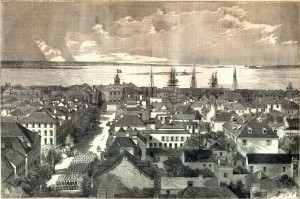White male Christians of the South often appeal to images of godly women to remind soldiers of their honor or duty.
A letter composed by a soldier stationed in the besieged city of Charleston, South Carolina this month is a case in point.
While the attention of both the United and Confederate states is riveted on Petersburg (and hence Richmond) and Atlanta, Charleston, the heart of the Confederacy, is effectively cut off and largely destroyed by a Union naval blockade.
Although not often front page news, newspapers North and South have for months followed the declining fortunes of Charleston. The business district lies in blackened ruins, houses in the lower peninsula are deserted, and the town’s population is now comprised largely of soldiers.
On most days, shells fall upon the town, as more than 10,000 shells have been fired upon the city since early July.
The heart of the Confederacy, in short, is a blackened, wretched shadow of its former antebellum grandeur.
Against this somber backdrop, the soldier letter from Charleston, in part a confession, is published in the Georgia Baptist Christian Index.
Permit me, through your paper, to give my thanks to my mother for the religious examples and training of my early life, which, had it not been my good fortune to have been the recipient of I might have strayed much farther from the paths of peace and virtue; but when I am tempted to go into vice and sin, if the enemy of souls get the advantage of me for a short time, the early and and the later training which I have received, soon causes me to think and turn back. It has been a lamp to my feet, and a light to my path. I have been for the last three years absent from home with my comrades in the army, fighting for all that is dear to us on this earth–exposed all the time to the many vices of a camp life–excluded from society, and a large portion of the time from the hearing of the gospel; but I have never forgotten the care and anxiety of my dear old mother at home, praying for me. I am the last one of three brothers left from the cruel fortunes of War, and I know her creases; but I wish to assure her, I will try to live as she has taught me–for Christ. I am young, and sometimes a little wild, but it is my desire to do right ….
Surrounded by despair, one soldier nonetheless finds hope in memories of his mother back home.
Sources: Brian Hicks, “Charleston at War: Summer of 1864 Hard on Charleston,” Post and Courier, April 17, 2011 (link); “Siege of Charleston,” New York Times, August 8, 1864 (link); Douglas W. Bostick, Charleston Under Siege: The Impregnable City, Charleston, History Press, 2010 (link); S. H. Lowther, “Letter from Charleston,” Christian Index, September 2, 1864



